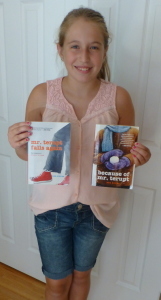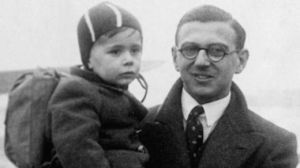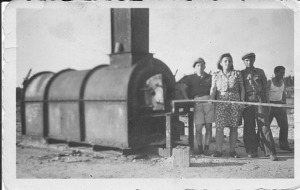Hanna Perlstein Marcus's Blog, page 11
January 27, 2016
International Holocaust Remembrance Day, 2016
 It is hard to believe that seventy-one years have passed since the liberation of Auschwitz. My mother and her sister, Laura, spent several months there before they were transported to several other concentration camps. Although they were unaware of it at the time, their entire family was exterminated on the very first day of their arrival. Only they were chosen to live as slave laborers, and just my mother, Sidonia, ultimately survived the war.
It is hard to believe that seventy-one years have passed since the liberation of Auschwitz. My mother and her sister, Laura, spent several months there before they were transported to several other concentration camps. Although they were unaware of it at the time, their entire family was exterminated on the very first day of their arrival. Only they were chosen to live as slave laborers, and just my mother, Sidonia, ultimately survived the war.
It was a lonely, somewhat reclusive life for Sidonia in her new country, yet she was able to display her masterful talent with a needle and thread and become the personal dressmaker for hundreds of members of her community. My new book, currently titled Surviving Remnant, still to be published, describes her life and mine among the refugees we encountered upon our arrival in America–a memorable era in our lives.
My mother’s identity card, upon leaving the Bergen Belsen Displaced Persons Camp, and boarding the ship to America.

October 13, 2015
East Longmeadow Library
November 7, 2015–1 pm
Come and visit Hanna at the East Longmeadow, MA Library, 60 Center Square, for an afternoon presentation about Sidonia’s Thread. Where will the story take us in Hanna’s next book? Catch some previews this afternoon.

October 7, 2015
Robert Weiss and Lou Grant
I used to love The Mary Tyler Moore Show back in the ‘70’s. Mary, a single woman in her thirties, moved to Minneapolis to take the job of Associate Producer at the local station’s “Six O’Clock News.” The cast of characters, including her colleagues at the station and her friends, were so distinctive and memorable. The relationship that struck me the most, however, was that of Mary and her boss, Lou Grant, the tough but kind-hearted producer of the news. During the seven years of the show’s run, I never heard Mary call him “Lou.” She had so much respect and admiration for him that she could only bring herself to address him as “Mr. Grant.” I could identify.
In the ‘80’s, I was a young social worker who had moved my way up the ladder in a large Connecticut municipality. When I heard of an opening for the position of director of a new human services department in Manchester, Connecticut, I wasn’t initially too interested. But then, I met the Town Manager, Robert B. Weiss. He was in his late ‘50’s then, with an assured manner, keenly focused eyes, a sly smile, a pronounced Boston accent, and a vast knowledge of local government. Moreover, he conveyed a studied vision of how to improve the well-being of the town’s residents. After our first meeting, I knew if he chose me to head the new department, I would absolutely say yes. When I received the call that he had decided I would be the best choice, I was excited to join him in his vision.
Over the next nine years, Manchester, Connecticut underwent a transformation. Under Robert Weiss’ leadership, it became a focal point of development, including the construction of a new regional mall on previously unused tobacco fields, a major retail outlet’s distribution center, industrial park development, and expansion of housing opportunities for various segments of the population. The attraction? The Town Manager’s creative use of taxation incentives for businesses to come and thrive in Manchester.
His ultimate goal in enticing business development was not just for development’s sake, he told me. It was to enhance the tax base to allow for more opportunity for its residents, to make the town one in which the well-being of its residents was the highest priority. Human services was the endgame and those of us in the department always knew we were just carrying out his vision.
Robert Weiss retired in 1989, just as the mall that he had envisioned was about to be launched. A few years later, in 1994, the town purchased the old Post Office building in the center of town, as he had always desired, and its main occupant became the Human Services Department. It’s name was appropriately the Weiss Center.
My old boss passed away two weeks ago at the age of ninety-three. Of all the people I have ever met, he was the one who demanded my utmost respect. Many of his colleagues called him “Bob,” but like Mary Tyler Moore, I could only bring myself to call him “Mr. Weiss.”
Above image of Mrs. Weiss, Joanne Cannon, Community Health Nurse, Mr. Weiss, and me, 2000

Robert Weiss and Lou Grant
I used to love The Mary Tyler Moore Show back in the ‘70’s. Mary, a single woman in her thirties, moved to Minneapolis to take the job of Associate Producer at the local station’s “Six O’Clock News.” The cast of characters, including her colleagues at the station and her friends, were so distinctive and memorable. The relationship that struck me the most, however, was that of Mary and her boss, Lou Grant, the tough but kind-hearted producer of the news. During the seven years of the show’s run, I never heard Mary call him “Lou.” She had so much respect and admiration for him that she could only bring herself to address him as “Mr. Grant.” I could identify.
In the ‘80’s, I was a young social worker who had moved my way up the ladder in a large Connecticut municipality. When I heard of an opening for the position of director of a new human services department in Manchester, Connecticut, I wasn’t initially too interested. But then, I met the Town Manager, Robert B. Weiss. He was in his late ‘50’s then, with an assured manner, keenly focused eyes, a sly smile, a pronounced Boston accent, and a vast knowledge of local government. Moreover, he conveyed a studied vision of how to improve the well-being of the town’s residents. After our first meeting, I knew if he chose me to head the new department, I would absolutely say yes. When I received the call that he had decided I would be the best choice, I was excited to join him in his vision.
Over the next nine years, Manchester, Connecticut underwent a transformation. Under Robert Weiss’ leadership, it became a focal point of development, including the construction of a new regional mall on previously unused tobacco fields, a major retail outlet’s distribution center, industrial park development, and expansion of housing opportunities for various segments of the population. The attraction? The Town Manager’s creative use of taxation incentives for businesses to come and thrive in Manchester.
His ultimate goal in enticing business development was not just for development’s sake, he told me. It was to enhance the tax base to allow for more opportunity for its residents, to make the town one in which the well-being of its residents was the highest priority. Human services was the endgame and those of us in the department always knew we were just carrying out his vision.
Robert Weiss retired in 1989, just as the mall that he had envisioned was about to be launched. A few years later, in 1994, the town purchased the old Post Office building in the center of town, as he had always desired, and its main occupant became the Human Services Department. It’s name was appropriately the Weiss Center.
My old boss passed away two weeks ago at the age of ninety-three. Of all the people I have ever met, he was the one who demanded my utmost respect. Many of his colleagues called him “Bob,” but like Mary Tyler Moore, I could only bring myself to call him “Mr. Weiss.”
Above image of Mrs. Weiss, Joanne Cannon, Community Health Nurse, Mr. Weiss, and me, 2000

September 16, 2015
More Lauren’s Enlightening Recommended Books: Just Right for the Jewish New Year
If there were one super power I wish I had, it would be telepathy. Maybe it would drive me insane knowing the thoughts of the people around me without their ever speaking a word, but it would also give me wondrous insight into the thoughts of those who are unable to verbalize and communicate in the usual way. If I knew more about what they were thinking, I could enhance my understanding of people with disabilities or even those who are not disabled but look different from me. How do they really view the world? The closest I will ever get, however, to understanding what goes on in their minds is in two books that my granddaughter, Lauren, urged me to read, Sharon M. Draper’s Out of My Mind and R. J. Palacio’s Wonder…two stories about extraordinary fifth graders.
Melody, the main character in Out of My Mind, might be among the smartest students in her school, but no one knows it. She can’t talk or walk or express in any way the words that “have always swirled around…like snowflakes” in her head. She has absorbed and retained the thoughts of every aspect of life that she has observed, but “thoughts need words. Words need a voice.” The comparisons between her life and that of her pet fish, Ollie, who “swims around that bowl all day long” are strangely parallel. For the first part of the story, Melody is just unable to express all the words and thoughts that have piled up in her brain to anyone at home or school. Yet, she has been fortunate to have an advocate like Mrs. V., who helps care for her and understands her like no one else and a family that exhibits unbounded love.
As the story unfolds, Melody is allowed the opportunity to join an inclusionary classroom where she meets some students outside her special needs classroom. Even though many of the students callously rebuff her, she begins to make some friends and feels liberated from the low expectations that have haunted her ever since she started school.
Her chance to show everyone her true knowledge comes with her acquisition of a computerized device that easily allows her to communicate with her fellow students, teachers, and family. As the world begins to understand Melody’s exceptional intellect, she confronts new friends and expectations, and a team competition that throws a curve at her efforts for acceptance. Yet Melody’s courage and resilience in her journey toward revelation and fulfillment are truly inspirational.
August is the character at the center of Wonder. His wisdom, similar to Melody, is much more mature than his years. Born with a deformity that has distorted his face, he is otherwise an ordinary boy who yearns for friendship and inclusion. Home schooled until the fourth grade, he starts fifth grade at nearby Beecher Prep, a change that Auggie dreads. Like the first two of Lauren’s recommended books, the story is told from the viewpoint of various narrators who are also characters in the story, like Auggie’s sister Via, her boyfriend, and fellow students. This style of writing, which incorporates multiple narrators, really appeals to me.
At Beecher Prep, Auggie sometimes finds it difficult to know who his friends really are. At first, most of the student body exposes him to ridicule for the oddness of his veneer. Yet a few students take the time to get to know him and admire him for his sense of humor and fine intellect. But it takes a class outing at a nature reserve where Auggie confronts an older, mean spirited group of boys to show his classmates his strength of courage and coolness under intense pressure. Auggie’s school experience will never be the same after that.
My favorite part of Wonder are the precepts Auggie’s teacher, Mr. Browne, posts each month and those sent in by various students in his class. They still swirl around in my brain as reminders of how I want to live my own life. Two great examples: “When given the choice between being right and being kind, choose kind” (Dr. Wayne W. Dyer) and “Your deeds are your monuments” (inscription on an Egyptian tomb).
Lauren’s careful reading choices, although originally meant for younger readers, have taught me lessons about perseverance, courage, determination, and tolerance and understanding of human difference. In this season of Jewish renewal and introspection, as I strive to be the best I can be, I hope my own writing can capture the best of human character and emotion as well.

More Lauren’s Enlightening Recommended Books: Just Right for the Jewish New Year
If there were one super power I wish I had, it would be telepathy. Maybe it would drive me insane knowing the thoughts of the people around me without their ever speaking a word, but it would also give me wondrous insight into the thoughts of those who are unable to verbalize and communicate in the usual way. If I knew more about what they were thinking, I could enhance my understanding of people with disabilities or even those who are not disabled but look different from me. How do they really view the world? The closest I will ever get, however, to understanding what goes on in their minds is in two books that my granddaughter, Lauren, urged me to read, Sharon M. Draper’s Out of My Mind and R. J. Palacio’s Wonder…two stories about extraordinary fifth graders.
Melody, the main character in Out of My Mind, might be among the smartest students in her school, but no one knows it. She can’t talk or walk or express in any way the words that “have always swirled around…like snowflakes” in her head. She has absorbed and retained the thoughts of every aspect of life that she has observed, but “thoughts need words. Words need a voice.” The comparisons between her life and that of her pet fish, Ollie, who “swims around that bowl all day long” are strangely parallel. For the first part of the story, Melody is just unable to express all the words and thoughts that have piled up in her brain to anyone at home or school. Yet, she has been fortunate to have an advocate like Mrs. V., who helps care for her and understands her like no one else and a family that exhibits unbounded love.
As the story unfolds, Melody is allowed the opportunity to join an inclusionary classroom where she meets some students outside her special needs classroom. Even though many of the students callously rebuff her, she begins to make some friends and feels liberated from the low expectations that have haunted her ever since she started school.
Her chance to show everyone her true knowledge comes with her acquisition of a computerized device that easily allows her to communicate with her fellow students, teachers, and family. As the world begins to understand Melody’s exceptional intellect, she confronts new friends and expectations, and a team competition that throws a curve at her efforts for acceptance. Yet Melody’s courage and resilience in her journey toward revelation and fulfillment are truly inspirational.
August is the character at the center of Wonder. His wisdom, similar to Melody, is much more mature than his years. Born with a deformity that has distorted his face, he is otherwise an ordinary boy who yearns for friendship and inclusion. Home schooled until the fourth grade, he starts fifth grade at nearby Beecher Prep, a change that Auggie dreads. Like the first two of Lauren’s recommended books, the story is told from the viewpoint of various narrators who are also characters in the story, like Auggie’s sister Via, her boyfriend, and fellow students. This style of writing, which incorporates multiple narrators, really appeals to me.
At Beecher Prep, Auggie sometimes finds it difficult to know who his friends really are. At first, most of the student body exposes him to ridicule for the oddness of his veneer. Yet a few students take the time to get to know him and admire him for his sense of humor and fine intellect. But it takes a class outing at a nature reserve where Auggie confronts an older, mean spirited group of boys to show his classmates his strength of courage and coolness under intense pressure. Auggie’s school experience will never be the same after that.
My favorite part of Wonder are the precepts Auggie’s teacher, Mr. Browne, posts each month and those sent in by various students in his class. They still swirl around in my brain as reminders of how I want to live my own life. Two great examples: “When given the choice between being right and being kind, choose kind” (Dr. Wayne W. Dyer) and “Your deeds are your monuments” (inscription on an Egyptian tomb).
Lauren’s careful reading choices, although originally meant for younger readers, have taught me lessons about perseverance, courage, determination, and tolerance and understanding of human difference. In this season of Jewish renewal and introspection, as I strive to be the best I can be, I hope my own writing can capture the best of human character and emotion as well.

September 2, 2015
Lauren’s Enlightening Book Recommendations
I get my recommendations about reading material from a variety of sources. Sometimes a friend will tell me about a novel that kept her up all night, unwilling to leave the story for a good night’s sleep. Often I might get a heads up about a quirky, relatively unknown new book from the many online literary websites that are currently on the Internet. Sometimes it’s Facebook or Pinterest, or even a quick search on Amazon that peaks my interest in a particular book. Or it might be a non-fiction book I picked out on my own at a bookstore or library about a subject that interests me, like World War II history.
Lately, my 11 year-old granddaughter and avid reader, Lauren, has slyly recommended a few books that caused her to think about character, friendship, human difference, understanding, and courage. Maybe these books might make me view people in a different way than I ever did before, she advised me. Although written for children, usually in late elementary and middle school grades, these books resonate just as powerfully with adults. I’d like to tell you about them.
Lauren’s first recommendations were the first two books in a trilogy about the impact of a knowledgeable and compassionate teacher on each student in his fifth grade classroom. Rob Buyea, a former third and fourth grade teacher in my home state of Connecticut and currently teaching in Massachusetts, wrote Because of Mr. Terupt and Mr. Terupt Falls Again, in short chapters, using the voice of seven narrators…all students in Mr. Terupt’s class.
The students’ personalities, like in most school classrooms, couldn’t have been more distinct. They included the bully, the brain, the prankster, the new girl, the outcast, the chubby loner, and the boy who hates school. With such disparate personalities, the students struggled to know each other and respect their unique qualities. A first-time teacher and a man with a complicated past, Mr. Terupt not only had a special skill at dealing with each student’s individuality, but found both educational and fun ways to bring them all together into a cohesive team. Some of his techniques included dollar words and the team plant project. There is only one teacher that I remember from my school days who possessed such talent, my sixth grade teacher, Mr. Fisk, at Lincoln School in Springfield, Massachusetts. He impressed me so much that I mentioned him in my latest book.
But then, just as Because of Mr. Terupt began to show me how a great teacher could gain the admiration of his students, a shocking accident occurred on a snow day that challenged each of our student protagonists to deal with their home and school lives and think about their real life relationships, especially with their beloved teacher. How they reacted to the accident and grew as individuals and as a class made up the core of the first book. As you suspected, the accident involved Mr. Terupt and you will, no doubt, admire his compassionate, caring, and unselfish attitude toward his students by the time you finish.
The second book, Mr. Terupt Falls Again, brought the same students, to their good fortune, back to Mr. Terupt’s classroom for sixth grade. The author still used his short chapter style (similar to my own), and the seven different narrative voices. This time, though, I found out more about each student’s home life, including one student’s single mom and absent dad, a student’s fall into an older, dangerous crowd, one who found an abandoned baby and played a role in its adoption, a grieving family, and more about Mr. Terupt’s past. The students learned that solving problems and finding answers could be much easier and more fulfilling when they worked together.
Finally, as you will see with the rest of Lauren’s recommended books, both of these well-written stories brought home the power of forgiveness, strong friendships, standing up for what you believe, and the unforgettable impact that one compassionate person can have on the lives of many. Oh, how I yearn for all teachers to emulate Mr. Terupt! Based on the lessons I learned from the first two books, I look forward to reading the last book in the trilogy, published just this summer, Saving Mr. Terupt.
Look for more about Lauren’s recommended books coming next week!

Lauren’s Enlightening Book Recommendations
I get my recommendations about reading material from a variety of sources. Sometimes a friend will tell me about a novel that kept her up all night, unwilling to leave the story for a good night’s sleep. Often I might get a heads up about a quirky, relatively unknown new book from the many online literary websites that are currently on the Internet. Sometimes it’s Facebook or Pinterest, or even a quick search on Amazon that peaks my interest in a particular book. Or it might be a non-fiction book I picked out on my own at a bookstore or library about a subject that interests me, like World War II history.
Lately, my 11 year-old granddaughter and avid reader, Lauren, has slyly recommended a few books that caused her to think about character, friendship, human difference, understanding, and courage. Maybe these books might make me view people in a different way than I ever did before, she advised me. Although written for children, usually in late elementary and middle school grades, these books resonate just as powerfully with adults. I’d like to tell you about them.
Lauren’s first recommendations were the first two books in a trilogy about the impact of a knowledgeable and compassionate teacher on each student in his fifth grade classroom. Rob Buyea, a former third and fourth grade teacher in my home state of Connecticut and currently teaching in Massachusetts, wrote Because of Mr. Terupt and Mr. Terupt Falls Again, in short chapters, using the voice of seven narrators…all students in Mr. Terupt’s class.
The students’ personalities, like in most school classrooms, couldn’t have been more distinct. They included the bully, the brain, the prankster, the new girl, the outcast, the chubby loner, and the boy who hates school. With such disparate personalities, the students struggled to know each other and respect their unique qualities. A first-time teacher and a man with a complicated past, Mr. Terupt not only had a special skill at dealing with each student’s individuality, but found both educational and fun ways to bring them all together into a cohesive team. Some of his techniques included dollar words and the team plant project. There is only one teacher that I remember from my school days who possessed such talent, my sixth grade teacher, Mr. Fisk, at Lincoln School in Springfield, Massachusetts. He impressed me so much that I mentioned him in my latest book.
But then, just as Because of Mr. Terupt began to show me how a great teacher could gain the admiration of his students, a shocking accident occurred on a snow day that challenged each of our student protagonists to deal with their home and school lives and think about their real life relationships, especially with their beloved teacher. How they reacted to the accident and grew as individuals and as a class made up the core of the first book. As you suspected, the accident involved Mr. Terupt and you will, no doubt, admire his compassionate, caring, and unselfish attitude toward his students by the time you finish.
The second book, Mr. Terupt Falls Again, brought the same students, to their good fortune, back to Mr. Terupt’s classroom for sixth grade. The author still used his short chapter style (similar to my own), and the seven different narrative voices. This time, though, I found out more about each student’s home life, including one student’s single mom and absent dad, a student’s fall into an older, dangerous crowd, one who found an abandoned baby and played a role in its adoption, a grieving family, and more about Mr. Terupt’s past. The students learned that solving problems and finding answers could be much easier and more fulfilling when they worked together.
Finally, as you will see with the rest of Lauren’s recommended books, both of these well-written stories brought home the power of forgiveness, strong friendships, standing up for what you believe, and the unforgettable impact that one compassionate person can have on the lives of many. Oh, how I yearn for all teachers to emulate Mr. Terupt! Based on the lessons I learned from the first two books, I look forward to reading the last book in the trilogy, published just this summer, Saving Mr. Terupt.
Look for more about Lauren’s recommended books coming next week!

July 15, 2015
The Tale of an Upstander
Image courtesy of BBC.com
Sir Nicholas Winton, who recently passed away at the age of 106, should serve as an inspiration to anyone who dares to stand up for what they believe, and risk everything in the name of justice. Working almost alone, Sir Winton saved over 600 Czech children during World War II, and guided them to safety in England. Today, they and their descendants number over 6,000.
A young successful stockbroker in 1938, he was convinced to travel to Prague to help rescue children from certain death at the hands of the Nazi’s. Persuading British customs officials and foster parents to take in the saved children, he kept his brave act a secret for over half a century. He did not require the recognition from others as a reward for staying true to his internal moral convictions.
It is individuals like Sir Nicholas that inspire me to write about the courageous group of immigrant Holocaust survivors that my mother and I joined soon after arriving in America from a German displaced persons camp. Springfield, Massachusetts became our home after the horrors of war. Now, after writing Sidonia’s Thread, about growing up with my single mother and Holocaust survivor, I am completing my next story about the evolution of this survivor group from their entrance to America to the point at which each of them made their way in a new country through their resilience, courage, and persistent will. Like Sir Nicholas Winton, in their own way, they made a significant impact on their children, friends, and community.
I hope to keep you all informed as my new book winds its way to publication.

January 28, 2015
The Seventieth Anniversary of the Liberation of Auschwitz
We commemorated the seventieth anniversary of the liberation of Auschwitz this week. Actually, January 27 now coincidentally marks International Holocaust Remembrance Day and the day of Auschwitz’ liberation.
Auschwitz was the first concentration camp where my mother was interned. Most of her family, except for one sister, were gassed shortly after their arrival, just a few of over a million who perished there. My mother and her sister were chosen to work as slave laborers. After a few months, they were shipped to Dachau, and from there to die at Bergen Belsen. Only my mother’s sister, Laura, died there. My mother, Sidonia Perlstein, lived on to be liberated, and finally immigrated to America in 1949, living in Springfield, Massachusetts the rest of her days.
So much evidence exists of these horrors. Can anyone still be a Holocaust denier?











